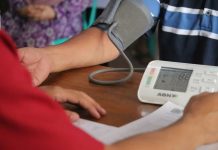
[av_one_full first min_height=” vertical_alignment=” space=” custom_margin=” margin=’0px’ padding=’0px’ border=” border_color=” radius=’0px’ background_color=” src=” background_position=’top left’ background_repeat=’no-repeat’ animation=”]
[av_heading heading=’REDS FIRM UP PANAY FORCE’ tag=’h3′ style=’blockquote modern-quote’ size=” subheading_active=’subheading_below’ subheading_size=’15’ padding=’10’ color=” custom_font=”]
BY RUBY SILUBRICO
[/av_heading]
[av_textblock size=” font_color=’custom’ color=”]
Sunday, April 2, 2017
[/av_textblock]
[av_textblock size=” font_color=” color=”]
ILOILO City – A lull in government offensives due to the peace talks has given the New People’s Army (NPA) in Panay Island the opportunity to consolidate its force.
The Communist Party of the Philippines (CPP) Panay regional committee admitted as much in a statement released to mark the 48th anniversary of its armed wing on March 29 and posted in the party’s official website.
“NPA units have widened their areas of operation and maintained their strongholds. They reached out to the wider mass base of farmers and peasants, organizing them and launching livelihood programs, boosting production and pricing, defending human rights and maintaining peace,” read part of the statement written in Hiligaynon.
The Panay regional committee also claimed a surge in the number of youths joining the revolutionary movement as full-time NPA fighters.
However, there have been no reported NPA offensives in Panay Island on March 29, according to the Philippine Army’s 3rd Infantry Division (3ID).
“We are happy that they celebrated their anniversary peacefully. No atrocities were committed. We hope that peace and order in the Visayas would continue,” said Major Ericson Rosana, spokesperson of the 3ID.
Still, Rosana said, government troops are not leaving anything to chance. Soldiers remain on alert status and ready to respond should there be NPA harassments, he stressed.
When the CPP revoked its unilateral ceasefire order in February, the NPA in Panay wasted no time launching offensives in southern and Panay.
“Two enemy combatants were killed, several were wounded and the NPA fighters were able to secure several military armaments,” read part of the CPP statement.
According to Senior Superintendent Harold Tuzon, director of the Iloilo Police Provincial Office, his office had not recorded any incidents in relation to the 48th NPA anniversary celebration in the province.
However, his men reported spotting NPA-sympathetic streamers hanged in a hinterland barangay in Lambunao, Iloilo.
One streamer read: “Mabuhay ang ika-48 na anibersaryo ng Bagong Hangaway sang Banwa – Jose Percival Estocado Jr. Command, NPA-Central Panay.”
“We do not rest and relax. We continue to be alert,” said Tuzon.
He ordered to his men not to leave their police station and always be alert.
With the resumption of the peace talks this month, the regional party committee said NPA-Panay is ready to follow the communist party’s directives and policies related to the negotiations.
But it ordered its forces to be prepared for possible offensives of government forces and paramilitary groups.
In Manila, President Rodrigo Duterte instructed the government peace panel to produce a signed bilateral ceasefire agreement with the communists when both panels resume talks in Utrecht, The Netherlands today until April 6.
Government chief negotiator Secretary Silvestre Bello III said this was the instruction given to them by the President.
Bello said there will be no unilateral declaration of ceasefire on the part of the government prior to the holding of the fourth round of talks.
The bilateral ceasefire issue is first on the agenda of the negotiations.
Also in the agenda of the fourth round is the Comprehensive Agreement on Socio-economic Reforms (CASER), which is the heart and soul of the negotiations because the issues would touch on addressing the root causes of the armed conflict.
On March 23 and 24, the government peace panel committee on socio-economic reforms met with 35 national government agencies (NGAs) to draw out their positions on the government’s draft CASER.
The positions of the NGAs will serve as points for the negotiation. These are the agenda on agrarian reform and rural development, national industrialization and economic development.
CASER is crucial to the peace negotiations because this will address the root causes of armed conflict such as land distribution, poverty and inequality, said Bello.
The government peace panel is targeting to seal the deal on CASER in six months of uninterrupted peace talks.
Land distribution and national industrialization were initial issues agreed to discuss under CASER during the third round of talks in Rome, Italy last January.
In the Rome talks, both parties set the ground rules for the conduct of the formal meetings between the panels of the Reciprocal Working Committees (RWCs) SER (socio-economic reforms).
The RWCs-SER agreed in principle to the distribution of land to farmers and farm workers as part of the governing framework of CASER.
This April 2 to 6, both panels are set to resume the stalled peace negotiations after the successful back channel talks on March 10 to 11 in Utrecht, The Netherlands where they also reiterate the reaffirmation of all bilateral agreements and statements made, including the Hague Joint Declaration, the Joint agreement on Safety and Immunity Guarantees, and the Comprehensive Agreement on Respect for Human Rights and International Humanitarian Law. (With a report from the Philippine News Agency/PN)
[/av_textblock]
[/av_one_full]




